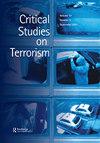Racial control under the guise of terror threat: policing of US Muslim, Arab, and SWANA communities
IF 2.5
Q2 POLITICAL SCIENCE
引用次数: 0
Abstract
ABSTRACT Using an analysis of U.S. government policies that have had high impacts on the personal safety and freedom of movement and expression of Arabs, Muslims, and others of Southwest Asian and North African (SWANA) origins living in or seeking to migrate to the US, this article argues that these policies mirror in significant ways a range of policies used currently and historically to police and control Black and brown bodies. Specifically, the article addresses three tactics shared across such policies: pre-emption, containment, and collective responsibility, and demonstrates how they are manifested in specific anti-terrorism and national security policies aimed at Arabs, Muslims, and others of SWANA origins, including Operation Boulder, the War on Terror, Special Registration, Countering Violent Extremism, and the Muslim Ban. The article also examines the outcomes of these policies in terms of actual convictions on terrorism charges (i.e. identifying terrorists) and finds limited results. It concludes that the alleged Muslim/Arab/SWANA domestic terror threat is in large part a social construction of the state. Finally, it argues that while US anti-terror policies are examined by most scholars outside of the lens of race, there is little reason to view them as exceptions to people of colour policing regimes.以恐怖威胁为幌子的种族控制:美国穆斯林、阿拉伯人和SWANA社区的治安
通过对美国政府政策的分析,这些政策对居住在美国或寻求移民到美国的阿拉伯人、穆斯林和其他西南亚和北非(SWANA)血统的人的人身安全和行动自由和言论自由产生了重大影响,本文认为这些政策在很大程度上反映了当前和历史上用于警察和控制黑人和棕色人的一系列政策。具体而言,本文论述了这些政策中共有的三种策略:先发制人、遏制和集体责任,并展示了它们如何体现在针对阿拉伯人、穆斯林和其他SWANA起源的具体反恐和国家安全政策中,包括“巨石行动”、反恐战争、特别登记、打击暴力极端主义和穆斯林禁令。本文还从对恐怖主义指控的实际定罪(即确定恐怖分子)的角度考察了这些政策的结果,发现结果有限。它的结论是,所谓的穆斯林/阿拉伯/SWANA国内恐怖威胁在很大程度上是国家的社会建设。最后,该报告认为,尽管大多数学者都在种族视角之外考察美国的反恐政策,但几乎没有理由将其视为有色人种警务制度的例外。
本文章由计算机程序翻译,如有差异,请以英文原文为准。
求助全文
约1分钟内获得全文
求助全文

 求助内容:
求助内容: 应助结果提醒方式:
应助结果提醒方式:


